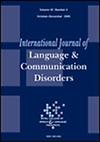Comparing factors influencing wellbeing in young adults with aphasia and young adults with developmental language disorder
Abstract
Background
Understanding factors influencing wellbeing is crucial for the development of effective services. Aphasia in older individuals and developmental language disorder (DLD) in children significantly affect how people live and function. Despite the increasing stroke incidence in young adults and the growing recognition of DLD as a lifelong disorder, the literature lacks evidence on the wellbeing of young adults, aged between 18 and 40 years old, with these conditions.
Aims
To identify factors influencing wellbeing in young adults with aphasia and DLD.
Methods & Procedures
This cross-sectional between-group study involved 78 young adults with aphasia, DLD and no language impairments, with mean (SD) age of 30.5 (6.38) years. A total of 12 measures were used to assess wellbeing, language, cognition, health, emotional distress, social functioning and psychological resources. Feasibility and acceptability were informed by a pilot-study. One-way-unrelated analysis of variance (ANOVA) and Kruskal–Wallis tests were used to compare groups on language, cognition and wellbeing, while correlation analyses identified factors influencing wellbeing in each group.
Outcomes & Results
No significant differences were found between clinical groups in language and cognitive profiles, with both scoring lower than those with no language impairments. The wellbeing of individuals with aphasia and DLD was similar to that of adults with no language impairments. Health, emotional distress and social support were common drivers of wellbeing among all groups, with positive performance in those scales indicating better wellbeing. Language and self-esteem showed significant links with wellbeing for those with DLD, but not for the aphasia group. The higher the self-esteem level of people with DLD, the higher their wellbeing rating. Interestingly, language was negatively related to wellbeing in people with DLD, with higher language scores correlating with lower levels of wellbeing.
Conclusions & Implications
Aphasia and DLD share factors affecting wellbeing, but the different origins of the disorders seem to influence the overall nature of wellbeing. Wellbeing in DLD is primarily impacted by the language disorder, whereas in aphasia it is influenced by its secondary to the disorder characteristics and primarily emotional health. This study highlights the need for holistic therapy and ongoing psychosocial support to optimize services for young adults with these impairments.
WHAT THIS STUDY ADDS
What is already known on the subject
- Aphasia and DLD significantly impact social and emotional aspects of life. However, knowledge about wellbeing in young adults with these disorders remains limited.
What this paper adds to the existing knowledge
- This research is the first to compare wellbeing in aphasia and DLD. It highlights the impact of several psychosocial factors and clinical characteristics including language on wellbeing, considering whether individuals developed language disorders during childhood or acquired them later in adult life. While there is a small amount of evidence on wellbeing in young adults with DLD, this is the first study to investigate wellbeing in young adults with aphasia.
What are the potential or actual clinical implications of this work?
- The type of language disorder may influence wellbeing in diverse ways. Speech and language therapists must evaluate the impact of these disorders on young adults’ wellbeing. Rehabilitation should consider both personal factors and external support systems, following appropriate care models. Our findings suggest that aphasia interventions might benefit from focusing on enhancing emotional wellbeing and social networks, particularly in young adults. For individuals with DLD, it appears that the emphasis should be on improving communication skills by addressing functional constraints in social interactions and considering their psychological resources. Further research is needed to confirm these potential intervention strategies. An interdisciplinary approach is essential for optimal outcomes.

 求助内容:
求助内容: 应助结果提醒方式:
应助结果提醒方式:


